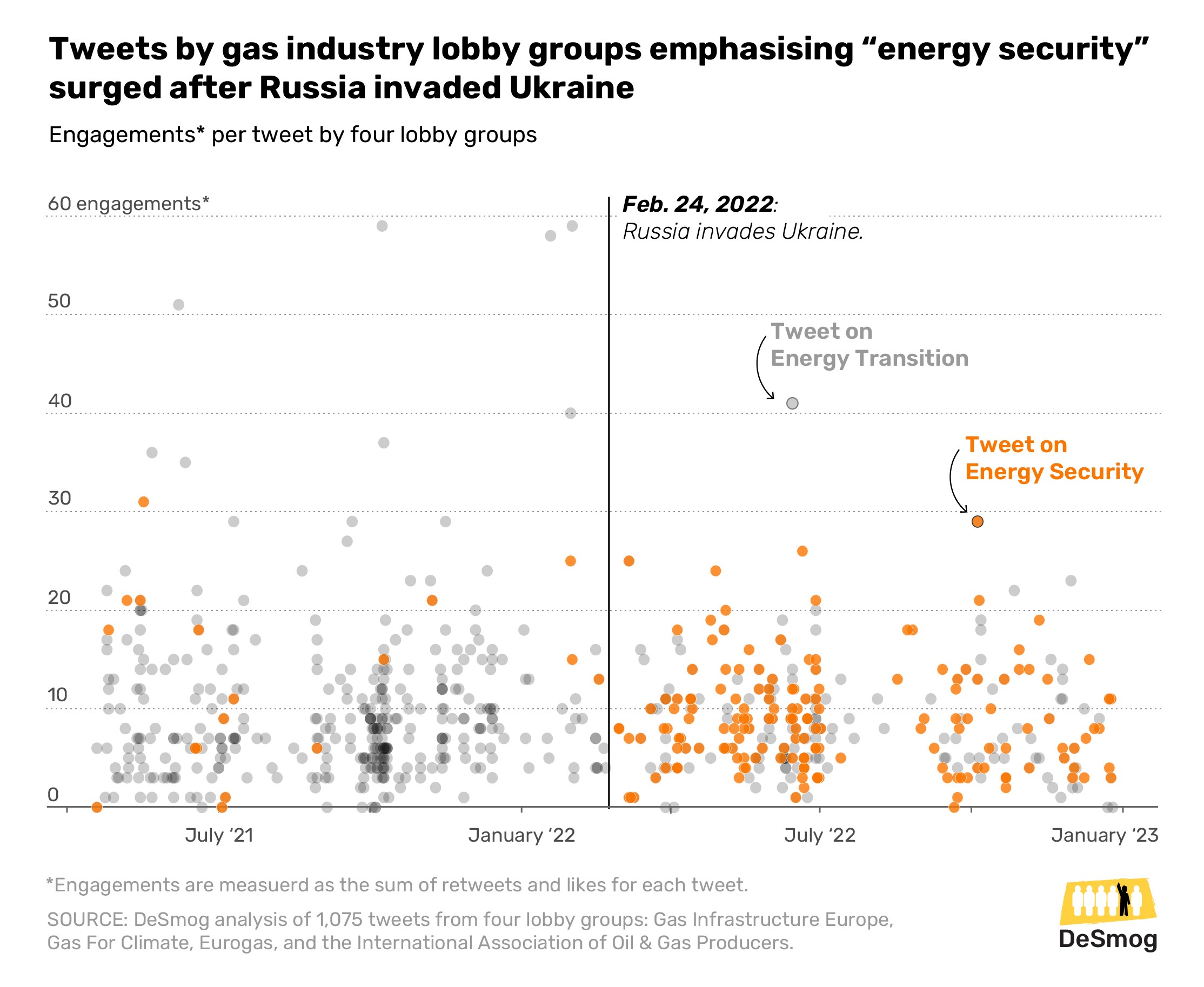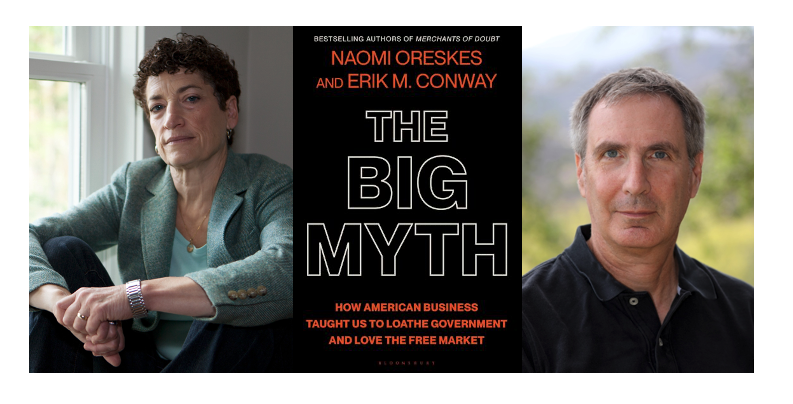
Message From the Editor
This week marked the one-year anniversary of Russia’s invasion of Ukraine. As we covered last year, the fossil fuel industry used the war as an opportunity to call for expanded production, lock in new LNG exports, and generally profit and push its agenda.
We’ve stayed on the beat all year, and this week are proud to share with you a new investigation that unveils how Europe’s gas lobby has exploited energy-security fears in the year since the war began.
We analyzed 1,075 tweets from four European gas lobby groups. In the 10 months prior to Russia’s invasion of Ukraine, only 3 percent of tweets from these four groups emphasized energy security or the prospect of an energy shortage or crisis; in the 10 months after the invasion, that grew to approximately 30 percent.
“The gas industry wants us to believe that more gas makes us more secure, but more gas leads to more climate change which in reality makes us less secure,” said Ben Franta, senior research fellow at the Oxford Sustainable Law Programme.
Dive into the investigation to learn what narratives the gas lobby is pushing.
Have a story tip or feedback? Get in touch: editor@desmog.com. Want to know what our UK team is up to? Sign up for our UK newsletter.
Thanks,
Brendan DeMelle
Executive Director
P.S. This powerful new investigation was developed with the support of Journalismfund.eu, but most of our work is made possible by readers like you. Can you donate $10 or $20 right now to support more of this essential work?
Image credit: Youyou Zhou
Europe’s Gas Lobby Exploits Energy Security Fears in Year Since Ukraine War
— By Stella Levantesi and Thomas Lewton (7 min. read) —
Europe’s gas industry has ramped up its messaging since Russia invaded Ukraine, exploiting fears over energy security to justify projects that risk locking the continent into long-term dependence on fossil fuels, DeSmog can reveal.
Four big industry groups began to post many more tweets portraying investments in gas and related infrastructure as the key to secure energy supplies soon after the invasion started — and maintained this strategy throughout last year, an analysis of their social media accounts found.
The Natural Gas Industry Sees Cow Manure Gas as the Key to a Net Zero Future
— By Cartie Werthman (9 min. read) —
Chevron has been talking a lot about cows lately. Alongside POLITICO articles about clean energy, in D.C. newsletters, on Facebook and LinkedIn, are Chevron’s recent ads featuring taglines like “We’re looking to turn the methane from cow 💩 into the fuels of the future.” Each ad links to a page on Chevron’s website which explains how methane captured from manure is actually “renewable natural gas.”
But Chevron isn’t the only one talking cow manure. As world leaders convened in Egypt last November to negotiate climate action at the United Nations COP27 summit, a dairy industry trade association also ran a social media campaign highlighting efforts to “upcycle methane” from cattle.
Hope Amid Climate Chaos: A Conversation with Rebecca Solnit
— By Stella Levantesi (9 min. read) —
From throwing soup against paintings, to blocking roads, to striking for the climate, to stopping private jets from taking off, activists worldwide are pushing harder than ever for action to address global warming. And they are delivering a clear and consistent message: What has long been accepted as the status quo — expanding fossil fuels, investing in polluting industries, oil and gas propaganda, greenwashing, climate change denial, governmental delay in climate action — is simply not acceptable anymore. The climate movement is working incessantly to make this clear to everyone.
When we talk about any movement, including the push for climate action, we’re talking about a “zeitgeist, a change in the air,” writer, historian, and activist Rebecca Solnit writes in her essay-turned-book Hope in the Dark, which focuses on the intersection of activism, social change, and hope.
How the Electric Utilities Industry Created One of the ‘Largest’ Propaganda Campaigns in U.S. History
— By Steve Horn (12 min. read) —
Science historians Naomi Oreskes and Erik M. Conway, authors of the classic 2010 book Merchants of Doubt: How a Handful of Scientists Obscured the Truth on Issues from Tobacco Smoke to Global Warming, have released a new book placing that doubt machine into a longer arc of U.S. business and political history.
The Big Myth: How American Business Taught Us to Loathe Government and Love the Free Market explores an even more ambitious history dating from the dawn of the 20th century to the present day.
Vivian Krause to ‘Oil Mafia’ Supporters: ‘The Environmentalists Have Won’
— By Taylor Noakes (9 min. read) —
Vivian Krause may well claim the title of the Canadian woman who launched a thousand op-eds.
For over a decade Krause’s claim — that American philanthropic organizations are influencing Canadian environmental groups — provided the basis for hundreds of editorials alleging a far-reaching conspiracy to landlock Canadian oil and gas resources. Columnists pointed to Krause’s research as evidence that American-backed eco-radicals had taken over federal and provincial governments in Canada, halted major pipeline projects, and “played right into the business interests of U.S. billionaires by becoming their useful idiots.”
From the Climate Disinformation Database: National Cattlemen's Beef Association
The National Cattlemen’s Beef Association (NCBA) is a U.S.-based 501(c)(6) trade association which exists “to work to increase profit opportunities for cattle and beef producers by enhancing the business climate and building consumer demand.” NCBA is one of the largest animal agriculture lobbyists in Washington D.C. The group has regularly funded and promoted research that downplays the impact of cattle production on climate change. It has lobbied against climate legislation and presented beef as a “climate change solution.”
Read the full profile and browse other individuals and organizations in our Climate Disinformation Database and Koch Network Database.







